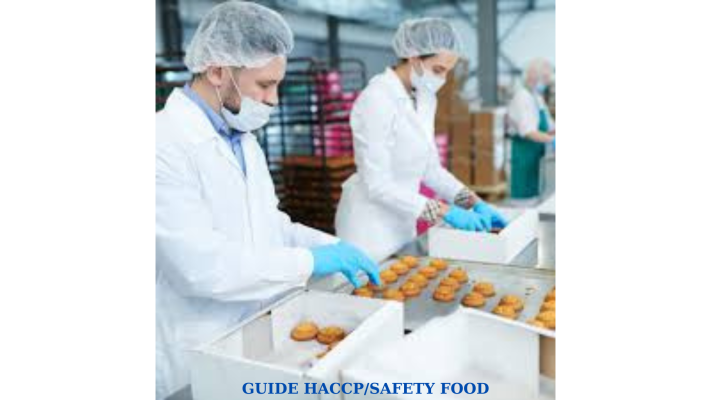HACCP, Safety Food, Guide HACCP— Hazard Analysis Critical Control Points—are critical to complaints with national or international food safety legalization.
OVERVIEW
HACCP—Hazard Analysis Critical Control Points—are critical to complaints with national or international food safety legalization. HACCP certification is for food manufacturing and it is required for any food business or organization carrying out any or all of the following activities: preparation, processing, manufacturing, packaging, storage, transportation, distribution, handling or offering for sale or supply of foodstuffs.
It provides a risk-based approach that supports other management systems standards across the food industry—like ISO 22000 Food Safety Management. It helps you identify hazards and manage the in same with appropriate control systems across the food supply chain.
According to EU Directive 93/43/EEC on Food Hygiene all food business operators in the European Union shall implement HACCP. They shall ensure that adequate safety procedures are identified, documented, maintained, and reviewed on the basis of the principles used to develop the system of HACCP. The Joint FAO/WHO Codex Alimentarius Commission describes a series of steps, including the 7 HACCP principles giving guidance for the application of the HACCP system. The General Principles of Food Hygiene, as recommended by Codex, form an intrinsic part of this document ‘Requirements for a HACCP-based Food Safety System’.
The 7 principles and the guidelines for the application of HACCP have been combined with basic elements of quality management systems (ISO 9000) to establish the Requirements for a HACCP based Food Safety System. HACCP ‘Requirements’ are not intended for application by suppliers and / or service companies to food businesses, like suppliers of packaging, food equipment, industrial cleaning services, etc.

SCOP AND APPLICATION
The food business operator shall define the extent (the scope) of the HACCP system.
The scope shall comprise that part of the food chain and those activities of the food business for which the food operator is responsible and can be held liable:
The part of the food chain for which the food business operator is responsible begins where the responsibility of the suppliers of raw materials and ingredients ends; the responsibility of the food business operator ends where another food business in the food chain takes over the responsibility. The scope shall therefore conform to purchase and sales contracts;
- All locations and process lines where food is manufactured and/or stored by the food business shall be properly indicated and be available for assessment;
- All products which are supplied to the market by the food business, whether processed or handled, shall be properly specified;
- All subcontracted activities (outsourced services, like packaging, storage, transport) shall be properly dealt with.
APPLICATION
HACCP food certification can be used by any organization directly or indirectly involved in the food chain and pharmaceutical industry including:
- Farms, fisheries and dairies
- Processors of meats, fish and feed
- Manufacturers of bread and cereals, beverages, canned and frozen food
- Food service providers such as restaurants, fast food chains, hospitals and hotels and mobile caterers
- Manufacturers of prescription and non-prescription drugs and remedies
FEATURES OF HACCP
- LEVEL 1
System Manual
- LEVEL 2
System procedures
- LEVEL 3
Work instruction, SOPs, Aspects-Impact, Hazard Risk analysis, HACCP, PPAP, FMEA, Control plan, Legal requirements, Energy Reviews, Carbon footprint, Risk Assessment, TCF
- LEVEL 4
Formats for maintenance of Records
HACCP IMPLEMENTATION BENEFITS
HACCP certification implementation improves / leads to
- Conformance to Legal and Regulatory Requirements
- Provide recognition throughout the supply chain as single standard approach to Food Safety
- Compliance with the Codex HACCP principles.
- Access to new markets through inclusion in the database of certified suppliers.
- Increase profits by aligning your products to retailer/consumer requirements.
- Improves the Safety and Quality of your product
- Demonstrates sustainable production and manufacturing best practices
- The ability to reduce the number and frequency of inconsistent and costly audits.
- Systematic management of prerequisite programs.
- Hazard analysis to evaluate threats to food safety.
- Dynamic communication on food safety issues with suppliers, customers, regulators and other interested parties.
- A systematic and proactive approach to identification of food safety hazards and development and Implementation of control measures.
- Customer confidence, satisfaction and trust
- Clear responsibilities and authorities agreed for all staff
- Improved use of time and resources
- Greater consistency and traceability of products and services
- Increases the level of Assurance in organizational quality
- Advances organizational profitability
- Ability to differentiate organization for competitive advantage
- Improves organizational credibility and reputation.
Contact us Hotline: 08 1275 3919
DQS CENTER provides certification consulting services, with globally recognized certificates. With the responsibility of Contributing to the cause of improving the quality of products and goods for businesses, along with the sustainable development of the business and its business motto Harmonious development, DQS CENTER is not only service provider, but also a reliable partner, a companion to share difficulties and problems with businesses in the process of operating the system.
Contact us to begin your certification process:
Hotline: 090 3376 569
Email: dqscenter@gmail.com
DQS CENTER Co., Ltd
Address: No. 617, Nguyen Dinh Chieu Street, Ward 2, District 3, HCMC

 Tiếng Việt
Tiếng Việt
